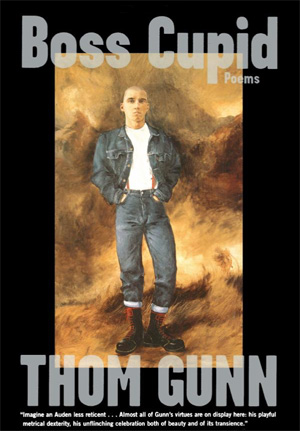 Boss Cupid
Boss Cupid
by Thom Gunn
Published by Farrar, Straus and Giroux
Published April 9, 2001
Poetry
112 pgs. • Find on Amazon.com
Reviewed by Stephen O. Murray
May 3, 2001.
As assured a master of metered and free verse as Thom Gunn is, I suspect that, like me, many of his readers don’t read a lot of other poetry.
According to the back cover copy of Boss Cupid, Gunn is “the quintessential San Francisco poet…and quintessentially a love poet, though not of quintessential love.” It is more than a little strange that if the publisher (Farrar, Straus and Giroux) was trying to be coy about Gunn’s homosexuality that they produced a front cover that screams “gay.”
Moreover, the volume begins with one gay poet (one who, unlike Gunn, was born in California) Robert Duncan and ends with a sometimes poet who, who before he became a king himself, famously loved a prince. Gunn’s focus in the final three poems is about David’s female amours, Bathsheba and Abishag, however. There is also a pair of poems about the mythical virgin Arethusa escaping or not escaping the river god Alpheus.
Along with such classical subjects, there are poems about specific, mundane details of the desires the aging poet (born in 1929) and others feel. He is bemused at the Lone Star bar to find obesity sought:
The democracy of it:
eventually everyone
can hope for a turn
at being wanted.
He recalls a young GI god glimpsed in 1943, some Latinos who sparked his interested more recently, various dead friends, Berkeley students, and an American boy to whom he writes:
Expertly you know you to maintain me
At the exact degree
Of hunger without starving. We produce
What warmth we can.
(A certain awkwardness about matching lines and thoughts is visible here. Gunn’s reading is determinedly “unpoetic,” though “prosaic” is not usually a term of praise for poets.)
The third of the three parts into which the volume is divided (by criteria that elude me) begins with imaginative attempts to understand a particularly hungry lover, Jeffrey Dahmer. Dahmer is a very unsettling subject for reclamation, and I seriously doubt that what Gunn projects as motivation fits the now-dead serial killer. For Gunn, Dahmer is someone who went to extremes trying to hold onto those he desired, to preserve them, as well as to consume them (here is a genuine “modern cannibal”…), wishes that are widespread. But it seems to me that Dahmer is the antithesis of the romantic poet who must lose beloveds in order to have the material for writing elegies. Gunn does not lack for such material, but still seems to me overly eager for his paradisical experiences and glimpses of imagined paradies to be over so that he can write about them.
Gunn is a master elegist (The Man with the Night Sweats in particular. In “Saturday Night” he writes of gay San Francisco of 1975:
that time is gone…
Our Dionysian experiment
To build a city never dared before
Dies without reaching to its full extent,
At least in the endeavor we translate
Our common ecstasy to a brief ascent
Of the complete, grasped paradisical state
Against the wisdom pointing us away….
and in “The 1970s”:
There are many different varieties of New Jerusalem,
Political, pharmaceutical—I’ve visited most of them.
But of all the embodiments ever built, I’d only return to none,
For the sexual New Jerusalem was by far the greatest fun.
There is a considerable range of subject matter and meter in this collection. There are some funny observations of other people along with mostly sad observations of himself and some brilliant illuminations of the anguishes of others (e.g., “The gas-poker,” “In the Post Office,” “Cat Island,” “The Dump” from the first part).
Although I read the volume from cover to cover in one sitting, I do not see how the parts cohere. At a reading, Gunn himself recalled that Duncan became so frustrated at deciding what to put together into a book of poems that he ceased to do so for fifteen years. It seems to me that the unity is temporal: this is a collection of poems Gunn wrote in the last decade or so.
Published by epinions, 3 May 2001
©2001, 2016, Stephen O. Murray
(Gunn died in 2004)

